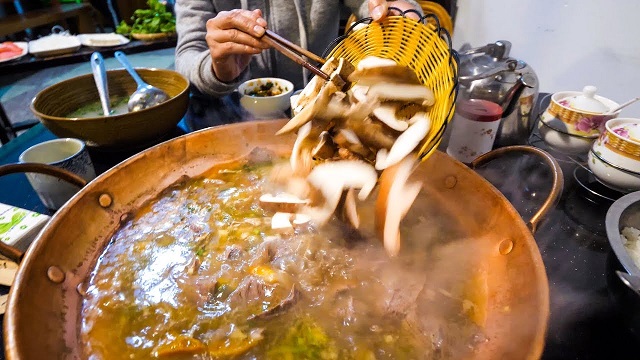
Swill oil from hotpots transformed into jet fuel
Chengdu, China | Xinhua | At a bustling hotpot restaurant in southwest China’s Sichuan Province, waiters pour each pot of leftover oil into a funnel-shaped oil-water separator in the kitchen. This oil is then sent to energy companies including Finnish Neste, PetroChina and Britain’s BP to be refined into automobile or aircraft fuel.
The key link in the recycling chain is the Sichuan Jinshang Environmental Protection Technology Company, based in Chengdu, the capital of Sichuan Province. It collects and processes leftover oil from the hometown of the hotpot, a famous dish that features a peppery bubbling tabletop oily broth in which meat and vegetables are cooked.
Due to the long-standing popularity of hotpot and other oily dishes, Chengdu is one of the country’s biggest producers of gutter oil.
The Qilin Pangge Hotpot Restaurant, one of the local fans’ favorite, serves about 1,000 customers a day at peak time and collects about 100 to 150 kg of swill oil a day.
The kitchen waste is fully recovered by Jinshang.
The environmental technology company produced more than 100,000 tonnes of industrial-grade mixed oil from recovered waste oil in 2022. Its products have exported to countries such as the Netherlands, France, Britain, Germany, Spain and Portugal.
Ye Bin, the general manager of Jinshang, keeps four bottles of oil samples on his desk: kitchen waste oil, industrial mixed oil, biodiesel and bio-aviation kerosene, respectively. The colors of the oils range from dark to light.
“Recycled bio-aviation kerosene is expected to make an important contribution to the emission reduction of the global aviation industry. It is safe and sustainable. Compared with traditional aviation fuels, the biofuel separated from kitchen waste oil has a maximum emission reduction of more than 80 percent,” Ye said.
He said the company began exporting kitchen waste oil to overseas energy companies in 2015.
With a growing demand for the recycled bio-resources worldwide, Jinshang now uses about 70 to 80 percent of the recovered kitchen waste oil in Chengdu for the production of industrial-grade mixed oil and biodiesel. The company then supplies these products to energy companies.
According to the Chengdu Municipal Commission of Urban Management, the city’s booming catering sector produces about 400 tonnes of kitchen waste oil on average a day, which represents a relatively high level among China’s first- and second-tier cities.
“Our development objective is to directly participate in the production of bio-aviation kerosene and become a green aviation fuel supplier,” Ye said.
 The Independent Uganda: You get the Truth we Pay the Price
The Independent Uganda: You get the Truth we Pay the Price


